
Monticello was the primary plantation of Thomas Jefferson, the third president of the United States, who began designing Monticello after inheriting land from his father at age 26. Located just outside Charlottesville, Virginia, in the Piedmont region, the plantation was originally 5,000 acres (20 km2), with Jefferson using the labor of enslaved African people for extensive cultivation of tobacco and mixed crops, later shifting from tobacco cultivation to wheat in response to changing markets. Due to its architectural and historic significance, the property has been designated a National Historic Landmark. In 1987, Monticello and the nearby University of Virginia, also designed by Jefferson, were together designated a UNESCO World Heritage Site. The current nickel, a United States coin, features a depiction of Monticello on its reverse side.

Martha Dandridge Custis Washington was the wife of George Washington, the first president of the United States. Although the title was not coined until after her death, Martha Washington served as the inaugural first lady of the United States. During her lifetime, she was often referred to as "Lady Washington".
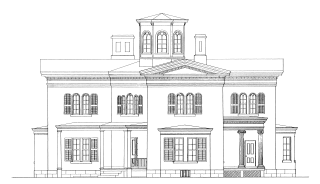
Cooleemee, also known as the Cooleemee Plantation House, is a house located between Mocksville and Lexington, North Carolina, at the terminus of SR 1812 on the Yadkin River in Davie County, North Carolina. It is a U.S. National Historic Landmark, designated in 1978 for its architecture.
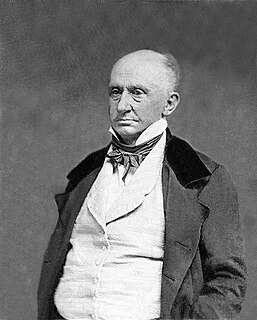
George Washington Parke Custis was an American plantation owner, antiquarian, author, and playwright. His father John Parke Custis was the stepson of George Washington. He and his sister Eleanor grew up at Mount Vernon and in the Washington presidential household.
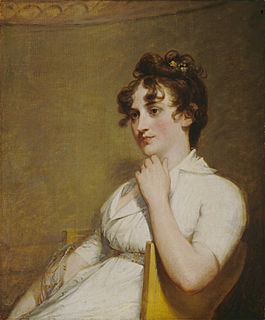
Eleanor Parke Custis Lewis, known as Nelly, was a granddaughter of Martha Washington and a step-granddaughter and adopted daughter of George Washington.
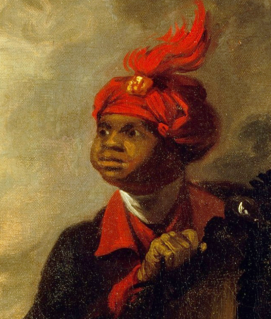
William Lee, also known as Billy or Will Lee, was a slave and personal assistant of George Washington. He was the only one of Washington's slaves who was freed immediately by Washington's will. Because he served by Washington's side throughout the American Revolutionary War and was sometimes depicted next to Washington in paintings, Lee was one of the most publicized African-Americans of his time.

The history of George Washington and slavery reflects Washington's changing attitude toward enslavement. The preeminent Founding Father of the United States and a hereditary slaveowner, Washington became increasingly uneasy with it. Slavery was then a longstanding institution dating back over a century in Virginia where he lived; it was also longstanding in other American colonies and in world history. Washington’s will provided for the immediate emancipation of one of his slaves, and additionally required his remaining 123 slaves to serve his wife and be freed no later than her death, so they ultimately became free one year after his death.
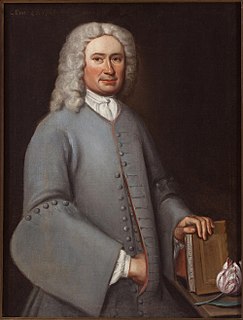
Colonel John Custis IV was an American planter, politician and military officer who sat in the House of Burgesses from 1705 to 1706 and 1718 to 1719, representing the electoral constituencies of Northampton County and the College of William & Mary. A prominent member of the Custis family of Virginia, he utilized his extensive landholdings to support an amateur career in horticulture and gardening.

Beaver Creek Plantation, under the ownership of George Hairston, was a large slave-holding tobacco plantation and the center of an empire in tobacco-growing and slave-trading built by the Hairston family, Scottish emigrants to Pennsylvania in the early 18th century. Located just outside today's Martinsville, Virginia, the plantation thrived in tobacco production and textile manufacturing, as well as producing household goods and raising livestock. At one point the enslaved blacks of Beaver Creek were tending a thousand yam plants; in one day they made 660 candles.
Harry Washington was a Black Loyalist in the American Revolutionary War, and enslaved by Virginia planter George Washington, later the first President of the United States. When the war was lost the British then evacuated him to Nova Scotia. In 1792 he joined nearly 1,200 freedmen for resettlement in Sierra Leone, where they set up a colony of free people of color.
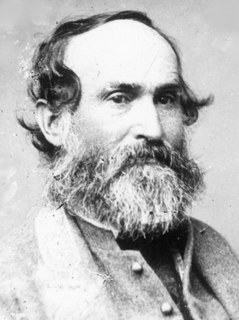
Jubal Anderson Early was a Virginia lawyer and politician who became a Confederate general during the American Civil War. Trained at the United States Military Academy, Early resigned his U.S. Army commission after the Second Seminole War and his Virginia military commission after the Mexican–American War, in both cases to practice law and participate in politics. Accepting a Virginia and later Confederate military commission as the American Civil War began, Early fought in the Eastern Theater throughout the conflict. He commanded a division under Generals Stonewall Jackson and Richard Ewell, and later commanded a corps. A key Confederate defender of the Shenandoah Valley, during the Valley Campaigns of 1864, Early made daring raids to the outskirts of Washington, D.C., and as far as York, Pennsylvania, but was crushed by Union forces under General Philip Sheridan, losing over half his forces and leading to the destruction of much of the South's food supply. After the war, Early fled to Mexico, then Cuba and Canada, and upon returning to the United States took pride as an "unrepentant rebel." Particularly after the death of Gen. Robert E. Lee in 1870, Early delivered speeches establishing the Lost Cause position. Early helped found the Southern Historical Society and memorial associations.

Thomas Jefferson, the third president of the United States, owned more than 600 African Americans during his adult life. Jefferson freed two of his slaves while he lived; seven others were freed after his death. Jefferson consistently spoke out against the international slave trade and outlawed it while he was president. He privately advocated gradual emancipation and colonization of slaves already in the United States, rather than immediate manumission.

The Samuel May Williams House is a former museum in Galveston, Texas. The second-oldest surviving residence in Galveston, it is now on the National Register of Historic Places. It was designated a Recorded Texas Historic Landmark in 1964.

The Moody Mansion, also known as the Willis-Moody Mansion, is a historic residential building in Galveston, Texas located at 2618 Broadway Street. The thirty-one room Romanesque mansion was completed in 1895. The home is named for William Lewis Moody, Jr., an American financier and entrepreneur in the cotton business who bought the home from Galveston socialite Narcissa Willis. The mansion was added to the National Register of Historic Places on May 13, 1994. Tours are offered, and the facilities can be rented out for weddings and other events.
Leatherwood Plantation of 10,000 acres was located in Henry County, Virginia, where Patrick Henry lived from 1779 until 1784. The plantation is probably named after Leatherwood Creek, a tributary to the Smith River (Virginia), which ran through the property.
Robert Hairston was an 18th-century gentleman planter, politician, and military officer in the Virginia Colony. He was an elected representative in both the House of Burgesses and the Virginia House of Delegates.
"Marrowbone" is a plantation house in Martinsville, Virginia, that may have been established in 1749. A frame house painted white, Marrowbone plantation was known widely for its hanging gardens and colonial boxwoods and cedars. John D. Rockefeller's gardeners scoured the countryside for authentic boxwoods or Buxus sempervirens for Colonial Williamsburg, and used some of the shrubs and cedars from Marrowbone for the restoration.
George Hairston was a noted planter and politician in Virginia. He was a Colonel in the American Revolutionary War and a Brigadier General in the War of 1812.

West Ford was the caretaker and manager of Mount Vernon, which had been the home of George Washington. Ford also founded Gum Springs, Virginia near Mount Vernon. He was a man of mixed-race, and possibly of Washington descent.
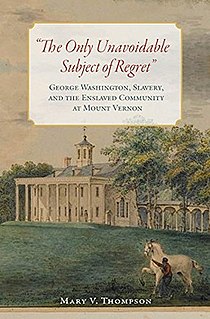
"The Only Unavoidable Subject of Regret": George Washington, Slavery and the Enslaved Community at Mount Vernon is a scholarly book on the history of slavery at Mount Vernon during the times of George Washington. Written by Mary V. Thompson, the book was published in the United States in 2019.















